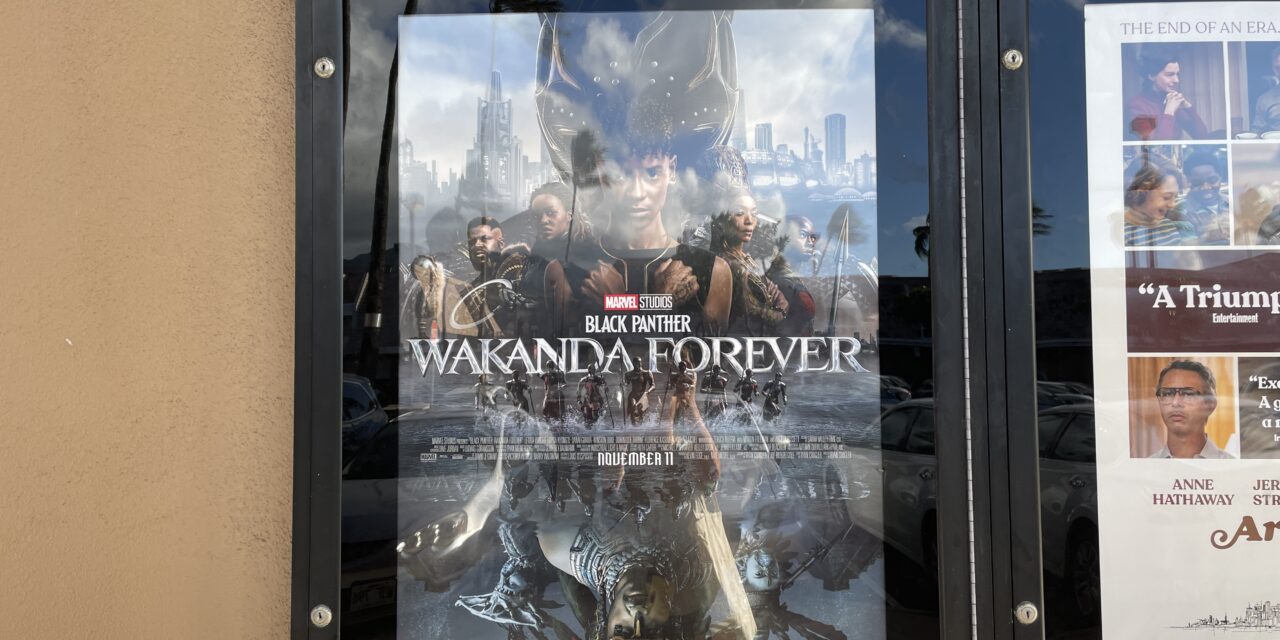“Black Panther: Wakanda Forever” adds diversity and new ideas to the Marvel Cinematic Universe. (Photo by Cameron Enomoto)
By Cameron Enomoto | Staff Writer
“Black Panther: Wakanda Forever,” released Thursday here in Hawaiʻi, has paved a new path forward for the Marvel Cinematic Universe. The focus on strong female roles and the struggles of indigenous peoples brings a fresh perspective to the possibilities that can be explored in future films.
Notably, though, this is the first Black Panther movie that has been released since the death of Chadwick Boseman in August 2020. Boseman had been battling colon cancer for four years before passing and is known for his role as T’Challa in the 2018 “Black Panther” film.
As seen in the trailer, Wakanda is mourning the loss of King T’Challa when challenges arise and the strength of the country’s leadership is tested. T’Challa’s death is especially hard on his sister, Shuri, who has difficulties processing her emotions related to her late brother. She blames herself for his death because of her inability to cure him of his unknown illness. Similar to how Boseman hid his colon cancer from the world, Shuri reveals that T’Challa dealt with his illness in silence until it was too late.
The conflict in the story begins with the indigenous people, inspired by Mesoamerican groups. These people are led by a man called Namor, who is also referred to as “Kukulkan,” or the feather serpent god. In his youth, he watched how his people suffered at the hands of colonizers from disease, slavery, and other inhumane treatments. His village had discovered a way to breathe underwater and used this to their advantage to create a home under the sea. Namor knew his people would be safe from harm there but had an ultimate goal of declaring war on the surface world. In order to prevent a war, Queen Ramonda (Angela Bassett), Shuri (Letitia Wright), Okoye (Danai Gurira), and other Wakandan officials must carefully determine a path that is right for their people.
While the struggles of indigenous people are briefly touched upon, it is evident that there is a huge connection between these issues and the actions of certain characters. As a Native Hawaiian, seeing this kind of portrayal on the big screen was amazing. Unfortunately, the severity of these issues is often overlooked and forgotten in real life. While the story is fictional, it highlights the fact that indigenous people often suffer the consequences of actions against them long after they have occurred.
The pain Namor feels while reflecting on what his people have endured is compared to the hardships Shuri faces as the younger sister of T’Challa and heir to the throne. A scene in the film shows memories from each of their lives in parallel so that both their similarities and differences are highlighted. This adds to their complexity and larger role in the plot as Namor puts the Wakandans between a rock and a hard place. This in turn sets up the stage for the next Black Panther to assume their rightful place as the next protector.
The big reveal for the next Black Panther was one of the main reasons I wanted to see the film. Without saying too much about who it is, I am ecstatic with the casting because the character development and turmoil that is overcome in the storyline make it hard to visualize anyone else in the Black Panther suit. In the end credits scene, it was confirmed that there will be another Black Panther film in the future. This opens up the floor for a number of opportunities with the change in casting, and I am certain that the new protector of Wakanda will do an extraordinary job bringing the film to life.
Similar to the first movie, the presence and abundance of female warriors are simply astounding. These women are not only intelligent but fierce fighters who are dedicated to Wakanda until the very end. I was happy to see that in ‘Wakanda Forever,” most of the fight scenes were carried out by female characters. Previous Marvel films are notorious for having a majority of male superheroes with a token female hero sprinkled in here and there. The amount of screen time that female protagonists had throughout the movie was truly empowering and sets a higher standard for directors and producers moving forward.
Ultimately, “Black Panther: Wakanda Forever” is an excellent movie, and everyone who has the chance to see it in theaters should go. The casting, music, costumes, and special effects heightened the film to its full potential, and it is a great sequel to the first film.






